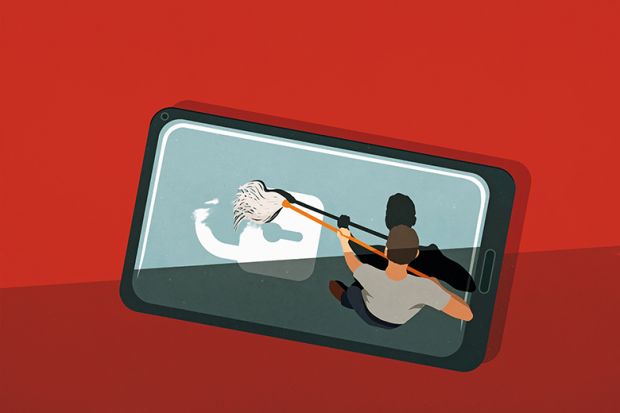If you live in the UK, you might have heard of the Online Safety Bill. Perhaps you have even overheard some of the debates about how, in its zeal to protect children from online pornography, the bill threatens to sacrifice end-to-end encryption. But answer this honestly: do you understand what end-to-end encryption actually is? And if you don’t, whose fault do you think that is?
We are on a seemingly irrevocable, accelerating path towards the mediation of each aspect of our existence by digital technology. As a father and teacher of digital security, I see that as a very precarious, badly designed future. Yet the lack of informed, relevant debate about the Online Safety Bill highlights that few people seem to understand enough about this future to have a firm view about it – or even to care. It is emblematic of how education has failed modern society.
In some ways, the bill is sadly typical of modern politics. It takes a worthy rallying point and makes it a vehicle for dystopian late-addition clauses highly toxic to free speech and civil liberties. But the ability of people to push back in this case is uniquely inhibited by their ignorance.
For our podcast, The Cybershow, my daughter and I interviewed members of the public about the bill. Whatever their educational background, no one was able to comment on its core concepts and trade-offs. The disconnect between the ideas people have about technology and their understanding of it is frightening.
To help law enforcement, the bill in effect seeks to outlaw end-to-end encryption, a concept necessary for the functioning of technological society, and to require “back doors” to be installed on people’s phones. Back doors are the most egregious privacy violations imaginable because, at the extreme, they grant undetectable access to everything: camera, microphone, call records, bank logins, the lot. That is why no respectable computer scientist in their right mind would ever install one.
Indeed, almost every professor of computer science and cybersecurity in the UK recently wrote to tell the government what a bad idea this was. And in an apparent last-minute retreat the government admitted that the kind of monitoring the bill seeks is not “technically feasible” without undermining end-to-end encryption. Yet it still plans to push the bill through anyway in case this changes one day! Such wishful thinking beggars belief for anyone who dabbles in science, reason and common sense.
How did we get to this technically and morally egregious position? My claim is that those who crafted the bill – like most of the rest of the population – were simply not competent to do so.
There are many reasons for this, not least the opacity of tech corporations. But we must hold educational institutions at least partly responsible.
About 200 years ago, in Massachusetts, Horace Mann founded the modern public school, with the aim of providing free, universal education. He saw democratic society as unable to function with ignorant citizens, while education set the conditions for emancipation, participation and prosperity. For these same social aims, Jeremy Bentham fought for equity of access to universities.
But modern education is focused primarily on personal benefits. Clamouring to please industry and satisfy students as “customers”, we’ve put economic advantage ahead of democratic health. Research from 2018 found that only 61 per cent of Americans now think education contributes to civic participation.
The UK’s secretary of state for science, innovation and technology, Michelle Donelan, comes equipped with a degree in history and politics and a previous career in marketing. But let’s not just pick on her. Not a single person I’ve met at universities can tell me how a smartphone works, including electronics engineers and computer scientists. Even within computer science degrees, very few courses at any level address the essentials of what we might call modern digital literacy. It is as if we had jumped from the 17th to the late 20th century to find schools teaching nothing about electricity, television or motor cars.
General complexity has grown so far and fast, while academic specialism has so narrowed, that we simply do not have the people, in government or in the voting booths, to face up to the issues that dominate these digital times. In place of real participative democracy, we are increasingly getting a mere simulation, characterised by deceit, propaganda and malign influence – all functions AI is increasingly able to automate and people are decreasingly able to discern, even if they have time to think.
As educators, we have failed to ensure the basics of intellectual self-defence. We have failed to synthesise joined-up civic knowledge at the intersection of technology, politics and human affairs. We must catch up at lightning speed – starting at master’s level and working downwards.
As a first step, have a read about end-to-end encryption and see if you can imagine a world without provably private communications in which banking, medicine, business, policing and even national security is possible.
Andy Farnell has been a visiting and associate professor in signals, systems and cybersecurity at a range of European universities. With Helen Plews and Ed Nevard, he now co-hosts The Cybershow, which seeks to restore understanding, safer use and control of everyday technology to ordinary people.
Register to continue
Why register?
- Registration is free and only takes a moment
- Once registered, you can read 3 articles a month
- Sign up for our newsletter
Subscribe
Or subscribe for unlimited access to:
- Unlimited access to news, views, insights & reviews
- Digital editions
- Digital access to THE’s university and college rankings analysis
Already registered or a current subscriber? Login









